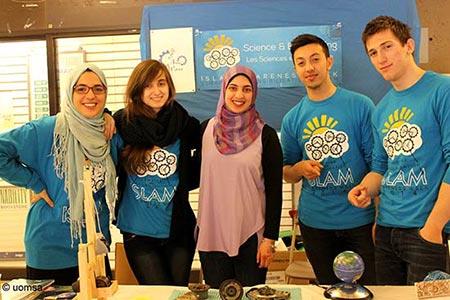Ottawa Univ. Discuss Islam’s Sustainability

“It’s a machine, and the way a machine works is that you have gears, and all of the gears have to be turning, and they have to be turning properly,” Shahad Khalladi, a second year student studying biomedical science, told Muslim Link, Ottawa’s Community Newspaper, on Sunday, March 16.
Khalladi, a member of Ottawa’s Muslim Students’ Association (MSA), has developed this year’s logo in collaboration with other IAW volunteers.
The logo demonstrates the various intersecting gears which have helped to sustain Islam over the centuries.
“This is a reminder to Muslims before anyone else that in order for Islam to ‘work’ we have to implement all parts of Islam and implement them properly,” she said.
“So you can see the gears include Qur’an, justice, science, women and all of these things work together to give us Islam.”
Explaining their idea to their colleagues, members of MSA organized this year’s annual Islam Awareness Week (IAW) from March 3rd to March 7th.
During the four-day event, students were able to visit various tables which explored different aspects of Muslim beliefs, including those surrounding environmentalism, arts and science.
At the “Environmentalism” table, IAW volunteers creatively explained the Islamic teachings by the Prophets on proper treatment of the environment.
At the “Arts” table passersby could have henna done while learning about the history of Islamic art and calligraphy.
At the “Science & Engineering” table, IAW students currently studying science informed visitors about the accomplishments of Muslim scientists.
Khalladi explained it was important to emphasize common ground instead of going straight to religious teachings.
“We had the idea of starting with materialistic things related to Islam, like scientific ideas that arose from Islam, things like health issues that the Prophet addressed,” she explained.
“We want to show that you can be a successful scientist who helps the scientific community but at the same time be a person of faith,” added Khalladi.
Misconceptions
At Women’s Table, students discussed how Islam emphasizes how men should behave towards all women.
“Men in Islam are not supposed to say bad things about women. We are not supposed to degrade women,” Ahmed Hussein, MSA president and an international development student, said.
“We cannot demean them through our words or our actions,” he shared.
Hussein was also passionate about the table on “Social Justice and Human Rights”.
“With the Arab Spring, the political uprisings around the Muslim world, with the rise of factions and terrorism and poverty being within Muslim countries, we need to ask what does Islam say justice is?” he pointed out.
“At the table, we try to explain that Islam is a just religion although Muslims around the world are not being just. Just because I am Muslim and follow Islam doesn’t mean I act upon it in the proper manner.
“Even within Canadian society, we are all Canadian but why do people break the law? One of the important things Islam Awareness Week tries to portray is that the actions of certain Muslims do not reflect Islam as a whole.”
Muslims make around 1.9 percent of Canada's 32.8 million population, and Islam is the number one non-Christian faith in the country.
A survey has showed the overwhelming majority of Muslims are proud to be Canadian.
Interfaith events usually help in correcting misconceptions about Muslims which resulted in a sharp increase in anti-Muslim views among Canadians.
Source: On Islam



